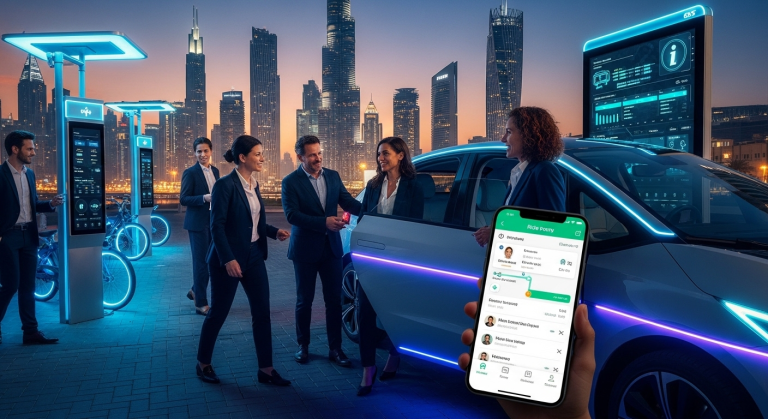Market Analysis and Opportunities
Dubai’s rapid urbanization, sprawling cityscape, and growing population have intensified both traffic congestion and environmental concerns. As the United Arab Emirates (UAE) drives toward sustainability (aligned with Vision 2030), the demand for innovative, eco-friendly, and convenient transportation solutions grows. A mobile app for carpooling services—connecting commuters, expatriates, and tourists for shared rides—presents a timely solution and a strong business in Dubai.
- Market Size and Growth: According to Statista, the ride-hailing and taxi market in the UAE was valued at over USD 700 million in 2022, with carpooling and shared mobility segments expected to grow at a CAGR of 8-12% through 2028. The anticipated population increase, Dubai’s Expo legacy, and a proactive smart city agenda further drive demand.
- Target Demographics: Dubai’s diverse, tech-savvy population includes millions of daily commuters and expatriates—most with smartphones and rising environmental awareness—which matches the target user profile for carpooling apps.
- Consumer Preferences: Increasing traffic, high parking costs, and growing green commitments influence commuters to seek cost-effective and sustainable transit. Surveys (e.g., by YouGov) indicate overwhelming support for ride-sharing solutions among UAE residents.
- Industry Trends: Key trends shaping the UAE market include digital transformation, cashless payments, government incentives for green mobility, and the integration of Artificial Intelligence (AI) and the Internet of Things (IoT) for route and matching optimization.
- Market Entry & Expansion Opportunities:
- Target daily commuters in business districts (Jumeirah Lake Towers, Downtown Dubai) initially.
- Expand to B2B partnerships with corporations aiming to provide employee transport as a sustainable perk.
- Broaden footprint regionally to Abu Dhabi and Sharjah, and eventually to GCC countries with similar urban challenges.
- Marketing Requirements: To stand out, robust market research and localized digital campaigns are mandatory. Tactics include:
- SEO-optimized landing pages with targeted keywords (e.g., “Dubai carpool app”)
- Collaborations with local influencers for trust building
- App store optimization and a multi-lingual interface (English, Arabic, Hindi, Urdu)
- Partnerships with the Roads and Transport Authority (RTA) and businesses for bulk onboarding
- Comprehensive branding strategies, highlighted through visually engaging campaigns and user testimonials
Comprehensive Business Overview
A mobile app for carpooling services in Dubai aims to transform urban mobility through peer-to-peer ride sharing. By connecting drivers with available seats and riders with similar routes and timeframes, the platform offers economic, environmental, and social benefits.
- Industry: Smart mobility, digital transport, and sustainability sectors.
- Business Model: Commission-based, charging a percentage fee per transaction, with added premium features (priority booking, corporate plans, or white-label partnerships for enterprises).
- Target Audience: Daily commuters, students, tourists, expats, and corporate employees in Dubai and, gradually, the broader UAE market.
- Operational Scope: Initially focused on Dubai (the MENA region’s trailblazer for smart mobility); scalable to other Emirates and cities.
Mission, Vision, and Objectives
- Mission: To make urban commuting in the UAE more affordable, eco-friendly, and connected through innovative technology.
- Vision: To become the leading smart mobility solution in the GCC, driving both sustainability and community engagement across urban centers.
- Core Objectives:
- Reduce single-occupancy vehicle traffic
- Minimize carbon emissions in line with national energy goals
- Deliver seamless, safe, and efficient commuting
- Foster a culture of shared mobility in the UAE
Business Stage and Location
The business is typically at either the “startup” or “early-stage growth” phase. Strategically, setting up in a Dubai Free Zone—like Dubai Internet City—offers 100% foreign ownership, world-class infrastructure, and simplified licensing, all suited for tech startups pursuing business in Dubai.
Competitive Advantage
Unique Value Proposition (UVP) and Key Strengths
- Entrepreneur’s Perspective:
- Viable entry due to strong unmet demand for efficient commuting and Dubai’s favorable regulatory stance towards tech-driven solutions.
- Agility for rapid iteration, leveraging local insights to refine algorithms and user experience.
- Investor’s Perspective:
- Exposure to the booming UAE smart mobility sector—projected to exceed USD 1.2 billion by 2027.
- Attractive scalability, high user retention (enhanced by network effects as more riders join), and opportunities for region-wide expansion.
- Government support for green startups and smart solutions, improving long-term policy alignment and exit opportunities.
- Manager’s Perspective:
- Operational efficiency through automation (AI-powered matching, predictive analytics for surge periods).
- Lower risk of regulatory crackdown due to alignment with Dubai’s sustainability and digital objectives.
- Potential for strategic partnerships with RTA, large employers, and universities to ensure steady demand.
- Strengths Supported by Data: Proprietary algorithms for dynamic pricing, multi-language support to reflect Dubai’s demographic reality, and integration with local payment solutions (e.g., Apple Pay, Emirates NBD wallet).
Financial and Investment Needs
Financial Requirements
- Initial Capital Estimate: A robust pilot in Dubai typically requires AED 1.5 million–2.5 million (investment consulting services can help refine projections). Cost breakdown includes:
- Development (app/web platform): AED 400,000–600,000
- Licensing & regulatory compliance: AED 100,000–200,000
- Staffing (tech, ops, marketing): AED 600,000–800,000 annually
- Marketing/branding launch: AED 250,000+ (initial 6–12 months)
- Ongoing operational and cloud costs: AED 200,000/year
Investment Potential
- Market Demand: High urban density, increasing commute times, and a growing green focus make the business attractive for investment in UAE.
- ROI and Scalability: Asset-light model with rapid user base scale-up, especially by onboarding corporate clients; pay-per-use and subscription models offer strong recurring revenue potential.
- Investment Models: Early-stage equity (angel or venture capital), convertible notes, or strategic corporate partnerships are well-suited.
Financial Risks and Mitigation
- Risks:
- Burn rate outpacing early revenue growth due to tech/marketing expenses
- Currency/FX risks for regional expansion
- Regulatory changes affecting ride-sharing business rules
- Mitigation:
- Diversify revenue (B2B/B2C, data analytics add-ons, ads)
- Secure multi-currency accounts; hedge exposure as operations expand
- Maintain legal counsel to stay ahead of compliance trends
Human Resources and Recruitment
Workforce Needs
- Core team of 8–15:
- Mobile/web developers (iOS/Android, Full Stack)
- UI/UX designers
- Operations (customer support, partnership managers)
- Sales and digital marketers
- HR and compliance officer
- Potential for scaling via outsourcing—particularly for marketing and analytics roles
>
- Critical Skills:
- Expertise in digital platforms, AI/ML, cloud infrastructure
- Multilingual support (English, Arabic, Indian subcontinent languages)
- Local knowledge of logistics and transportation compliance
HR Challenges
- Dubai’s competitive tech talent pool; high demand for IT and marketing personnel
- Retention requires competitive pay, training, and work-life balance initiatives
- To attract remote experts, flexible work arrangements and international talent acquisition strategies are recommended
Compliance with UAE Labor Laws
- Adherence to UAE Labor Law (contracts, visas, end-of-service benefits)
- Regular audits and alignment with Ministry of Human Resources & Emiratisation best practices
- Provide clear employment contracts, health insurance, and continuous legal review to ensure compliance
Infrastructure and Operations
Infrastructure Needs
- Initial office in Dubai Free Zone (cost-effective, tech-focused ecosystem, and simplified setup for foreigners).
- Cloud-based backend; scalable hosting (Azure/AWS/Google Cloud) with local data compliance
- Minimal hardware—primarily laptops, cloud access, and secure payment integrations
Operational Optimization
- Implement ERP or project management solutions for streamlined internal processes.
- Automate onboarding and customer support via AI-powered chatbots and self-service platforms.
- Monitor KPIs—ride fulfillment rates, cost per acquisition, uptime, and customer retention—to identify and resolve bottlenecks quickly.
Legal Compliance
- Register with Dubai Department of Economic Development (DED) or a relevant Free Zone authority (e.g., Dubai Technology Entrepreneur Campus)
- Secure necessary RTA approvals for ride-sharing activities
- Open a compliant bank account in UAE and maintain ongoing regulatory reporting
- Leverage business setup services for streamlined company formation and licensing
Innovation and Technology
- Leverage AI for user-ride matching, fare optimization, and predictive analytics.
- Integrate real-time traffic data, multi-lingual chat, and contactless payments for superior UX.
- Explore blockchain for secure payments or loyalty points.
- Regularly update app security and privacy protocols to maintain user trust.
Marketing and Branding Strategies
Brand Status and Positioning
- Initial focus on urban professionals, expatriates, and environment-conscious youth.
- Visual identity should communicate trust, convenience, and sustainability (green colors, simple logo design).
- Leverage Dubai’s reputation as a smart city in all branding touchpoints.
Marketing Channels
- Prioritize digital-first channels:
- SEO-optimized local landing page and app description (keywords: “Dubai carpool app,” “smart commute UAE”)
- PPC and social media (Instagram, LinkedIn, TikTok) geo-targeted to Dubai commuters
- Partnership marketing with local businesses, universities, and community events
- PR campaigns through both English and Arabic media outlets
- Leverage media coverage via local news sources (see Persian Horizon’s news portal)
360-Degree Campaigns
- Coordinate multi-channel campaigns:
- Social media influencer collaborations, referral programs, and corporate communications
- Email marketing targeted at business zones and residential communities
- Participation in events (e.g., Gitex, Sustainable City Expo) for high visibility
- Link offline initiatives (flyers in business clusters, university campaigns) with QR codes to app download pages
Growth and Development Potential
Growth Strategies
- Expand rapidly in Dubai by leveraging referrals, alliance with large employers, and integration with corporate transport initiatives
- Stage-wise regional roll-out: Sharjah, Abu Dhabi, and Northern Emirates
- Explore partnerships with public sector and smart city innovation hubs
Networking
- Build ties with city planners, RTA officials, university administrators, and major corporates for market credibility and user growth
- Leverage international business connections, and consider the benefits of Persian Horizon’s 57-country business network for scale-up and diversification
International Potential
- Dubai’s global reputation as a business and innovation hub makes it the perfect launch pad for GCC or global expansion
- Once proven, tech and operations can be replicated in smart cities across Saudi Arabia, Qatar, or North African hubs facing similar mobility challenges
Sustainability and Innovation
- Directly aligns with Dubai’s green vision—reducing emissions, easing congestion, and embodying the smart city ethos
- Incorporate carbon-offset programs, user rewards for eco-friendly behavior, and AI-optimized route planning to further boost green credentials
- Stay current with emerging trends in autonomous vehicles and mobility-as-a-service (MaaS)
Alignment with Dubai’s Market
Cultural Alignment
- Multi-language support, customizable profiles (e.g., female-only rides), and respect for privacy ensure resonance with Dubai’s cultural values
- Marketing should reflect Dubai’s cosmopolitan ethos—embracing both local Emirati and expatriate viewpoints
Local Regulatory Compliance
- Ensure ride-sharing operations comply with Dubai’s dynamic regulatory environment (including RTA, DED, and VAT rules)
- Proactively update company policies to match evolving commercial and tax laws
- Ongoing legal reviews minimize compliance risks; enlist business setup experts for efficient navigation of UAE regulations
Advantages of Dubai
- Tax-free profits, streamlined business setup, and investor-friendly regulations
- Unparalleled access to world-class infrastructure, smart city initiatives, and a large, affluent customer base
- Gateway positioning for entry into GCC and Africa via established trade routes
Local Challenges and Solutions
- High Competition: Counter strong incumbents (like Uber and Careem) with specialized branding, tailored routes (e.g., intercity or university-focused), and unique features.
- Operational Costs: Mitigate high early-stage burn by leveraging Free Zone incentives and scaling non-core functions through outsourcing.
- User Trust: Prioritize safety (background checks, live support, clear insurance policies) to differentiate from less regulated competitors.
Conclusion
A mobile app for carpooling services holds immense promise in the dynamic, ambitious market of Dubai and the wider UAE. With a compelling alignment to the UAE’s sustainability goals, an aspirational and tech-savvy populace, and world-class infrastructure, such a platform can thrive if it leverages local insights, cutting-edge technology, and robust compliance. Strategic positioning, partnership building, and an unwavering focus on user trust will be crucial for long-term success.
For entrepreneurs, investors, and managers, the smart mobility sector in Dubai offers lucrative potential—provided you execute thoughtfully and navigate regulatory, cultural, and operational challenges with precision. Success depends on diligent market analysis, agile adaptation, and effective resource allocation.
Take the Next Step
Considering launching or scaling your own carpooling app or another smart mobility business in Dubai? Leverage expert support, strategic advisory, and global networks from Persian Horizon. Explore tailored business setup services, market research, and investment consulting to ensure your new venture achieves sustainable growth amid Dubai’s thriving business ecosystem.







